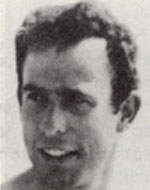Hagai, son of Adina and Aharon, was born on 24.12.1946 in Na’an, As a high school student, he worked in the orchard with his typical devotion and responsibility. Hagai was gifted with a great sense of technique and aesthetics, spent his leisure time in carpentry, building, assembling various instruments, soldering, and assembling tapes. At the end of a course for instructors, when he was in ninth grade, he taught the Aluma class. Hagai spent the third year in Kedma, where he was an exemplary court guard, a repairman, a builder, a lively social worker and an operator. After his marriage to Dafna, he moved to Be’er Tuvia, to her parents’ farm. were he built and renovated his new home, and in this house, his son Omri was born, who began to raise him with pride and happiness. On the farm, he built everything himself, with his “golden hands.” He also had a golden heart, an assistant to people, always loving and smiling, Hagai was easily absorbed in the social life of Be’er Tuvia. He took upon himself the youth training at the site, rehabilitated the club for them and initiated the appearance of a youth newspaper. His apprentices were closely followed and visited his house. When he fell, they dedicated for him the youth newsletter. Hagai, always with his “all right”, accompanied by a smile and his glowing eyes that is characteristic of his personality, was the living spirit during holidays and parties. The springy days he loved to dance from beginning to end. He plowed the country in length and breadth and organized trips, alone or together with his friends. There was also Hagai who loved to read poetry and beautiful stories, from the poems of Rachel and Pushkin to the clarinets of Ravindrant Tagore. Hagai remained attached to the house of Na’an with all his soul and was proud of his firstborn. He kept in touch with the guys. His warm relationship to his parents, his sisters, and Avrahamle, who adopted himself as his brother, was expressed in his frequent visits to Na’an.
Hagai was drafted into the IDF in mid-November 1966 and volunteered for the Armored Corps after completing basic training and an officer’s course, and took part in a course for armored corps officers and a course for commanders of an armored company and was sent to an advanced armor course after being recognized as an officer with outstanding skills and performance. He participated in the Six-Day War and was awarded the “Six Day War” and participated in the Karameh operation. (8.10.1973), in the Naqash-Hosheniya region of the Golan Heights, Hagai stood at the head of an armored force that took up positions of restraint in the face of the Syrian onslaught. Despite the quantitative inferiority vis-a-vis the Syrian armor, Hagai stood out coolly and resourcefully, His company destroyed a large number of tanks and allowed the force he was part of to go on a counterattack, in front of dozens of missiles, and Hagai’s tank was hit by a missile, he was killed and brought to rest. In the cemetery of Nanaan. After falling promoted to the rank of captain. Left a wife and son, parents and sisters. In a letter of condolence to the bereaved family, his commander wrote: “Hagai stood out with his strong will and perfection, and when he received a task, he was not restless until he completed it to the best of his abilities. With him, I appointed him commander of one of the great forces that was under my command. ” His students in Moshav Be’er Tuvia published a leaflet in his memory, in which members spoke of his character. One of the apprentices wrote: “Hagai should be remembered with pride: Hagai was a person who was subject to life – and he was not subordinate to them.”
